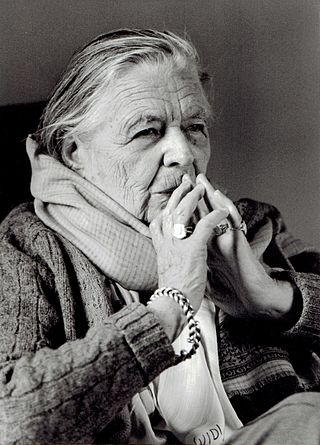
Marguerite Yourcenar was a Belgian-born French novelist and essayist who became a US citizen in 1947. Winner of the Prix Femina and the Erasmus Prize, she was the first woman elected to the Académie Française, in 1980. In 1965, she was nominated for the Nobel Prize in Literature.

Western fiction is a genre of literature set in the American Old West frontier and typically set from the late eighteenth to the late nineteenth century. Well-known writers of Western fiction include Zane Grey from the early 20th century and Louis L'Amour from the mid-20th century. The genre peaked around the early 1960s, largely due to the popularity of televised Westerns such as Bonanza. Readership began to drop off in the mid- to late 1970s and reached a new low in the 2000s. Most bookstores, outside a few west American states, only carry a small number of Western fiction books.
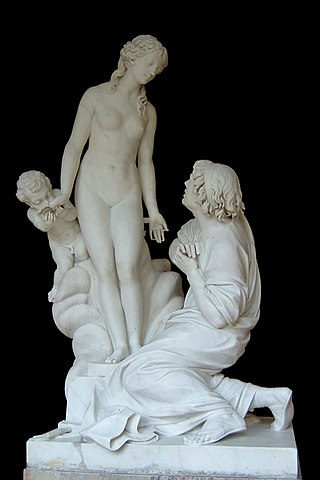
Galatea is the post-antiquity name popularly applied to the statue carved of ivory alabaster by Pygmalion of Cyprus, which then came to life in Greek mythology.

The samodiva, samovila or vila, are woodland fairies or nymphs found in South and West Slavic folklore.
René Laloux was a French animator, screenwriter and film director.
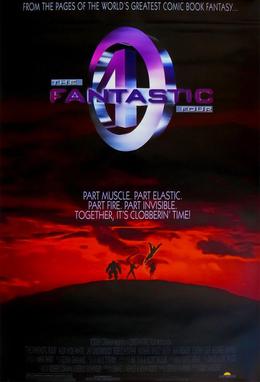
The Fantastic Four is an unreleased 1994 superhero film based on the Marvel Comics superhero team of the same name, created by Stan Lee and Jack Kirby. The film features the team's origin and first battle with Doctor Doom. Executive-produced by low-budget specialists Roger Corman and Bernd Eichinger, it was made to allow Eichinger to keep the Fantastic Four film rights. It was not officially released, although pirated copies have circulated since 1994 as well as various clips being available online.
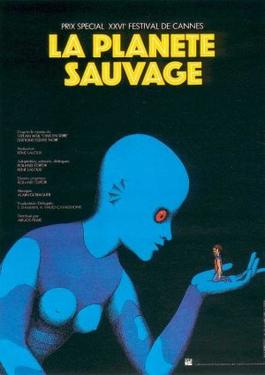
Fantastic Planet is a 1973 French-language experimental independent adult animated science fiction art film, directed by René Laloux and written by Laloux and Roland Topor, the latter of whom also completed the film's production design. The film was animated at Jiří Trnka Studio in Prague. The film was an international co-production between companies from France and Czechoslovakia. The allegorical story, about humans living on a strange planet dominated by giant humanoid aliens who consider them animals, is based on the 1957 novel Oms en série by French writer Stefan Wul.

Elements of the supernatural and the fantastic were an element of literature from its beginning. The modern fantasy genre is distinguished from tales and folklore which contain fantastic elements, first by the acknowledged fictitious nature of the work, and second by the naming of an author. Authors like George MacDonald (1824–1905) created the first explicitly fantastic works.

Mythago Wood is a fantasy novel by British writer Robert Holdstock, published in the United Kingdom in 1984. Mythago Wood is set in Herefordshire, England, in and around a stand of ancient woodland, known as Ryhope Wood. The story involves the internally estranged members of the Huxley family, particularly Stephen Huxley, and his experiences with the enigmatic forest and its magical inhabitants. The conception began as a short story written for the 1979 Milford Writer's Workshop; a novella of the same name appeared in the September 1981 edition of The Magazine of Fantasy & Science Fiction.
Linda Coverdale is a literary translator from French. She lives in Brooklyn, New York, and has a Ph.D in French Literature. She has translated into English more than 60 works by such authors as Roland Barthes, Emmanuel Carrère, Patrick Chamoiseau, Maryse Condé, Marie Darrieussecq, Jean Echenoz, Annie Ernaux, Sébastien Japrisot, Tahar Ben Jelloun, Philippe Labro, Yann Queffélec, Jorge Semprún, Lyonel Trouillot, Jean-Philippe Toussaint, Jean Hartzfeld, Sylvain Tesson and Marguerite Duras.

Mṛcchakatika, also spelled Mṛcchakaṭikā, Mrchchhakatika, Mricchakatika, or Mrichchhakatika is a ten-act Sanskrit drama attributed to Śūdraka (Simuka), an ancient playwright who is possibly from the 5th century CE, and who is identified by the prologue as a Kshatriya king as well as a devotee of Shiva who lived for above 110 years. The play is set in the ancient city of Ujjayini during the reign of the King Pālaka, near the end of the Pradyota dynasty that made up the first quarter of the fifth century BCE. The central story is that of a noble but impoverished young Brahmin, Sanskrit: Cārudatta, who falls in love with a wealthy courtesan or nagarvadhu, Sanskrit: Vasantasenā. Despite their mutual affection, however, the couple's lives and love are threatened when a vulgar courtier, Samsthānaka, also known as Shakara, begins to aggressively pursue Vasantasenā.
Jiggs was a male chimpanzee and animal actor who originated the character of Cheeta in the 1930s Hollywood Tarzan movies. He was owned and trained by Tony and Jacqueline Gentry.
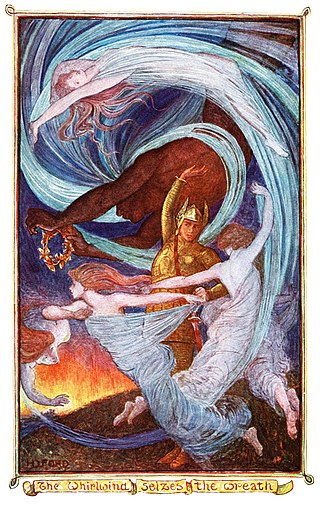
Fantasy is a genre of speculative fiction which involves themes of the supernatural, magic, and imaginary worlds and creatures.

The Peach Blossom Spring, or Peach Blossom Spring Story or The Peach Blossom Land was a fable written by Tao Yuanming in 421 CE about a chance discovery of an ethereal utopia where the people lead an ideal existence in harmony with nature, unaware of the outside world for centuries. The phrase can be used to describe an idealistic place of beauty and repose, although it is sometimes used to refer to an unrealistic dream.
Apostrophes was a live, weekly, literary, prime-time, talk show on French television created and hosted by Bernard Pivot. It ran for fifteen years from January 10, 1975, to June 22, 1990, and was one of the most watched shows on French television. It was broadcast on Friday nights on the channel France 2.

Jean Topart was a French actor. He was considered one of the best known voices on French television for decades. In addition to providing the voices and narration for television series and animated films, Topart often dubbed American and other foreign films into French.

Patricia Ann Lamkin was an American playwright, singer, songwriter, musician, actor, writer and editor.

The 1982 Nobel Prize in Literature was awarded to the Colombian writer Gabriel García Márquez (1927–2014) "for his novels and short stories, in which the fantastic and the realistic are combined in a richly composed world of imagination, reflecting a continent's life and conflicts."

Michèle Sarde, is a French writer, born in 1939. She taught French literature and culture, together with gender and intercultural studies at Georgetown University, Washington D.C., from 1970 to 2000. She is now a Professor emerita at that university and lives in Chile and France.

The 1983 Nobel Prize in Literature was awarded to the British author William Golding "for his novels which, with the perspicuity of realistic narrative art and the diversity and universality of myth, illuminate the human condition in the world of today".
















